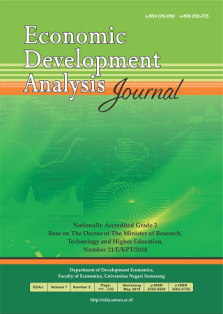Evidence of Credit Rationing in Indonesia: Income Class and Collateral
Abstract
The purpose of this study is to examine the factors that influence household credit availability in Indonesia. In addition, the likelihood of families obtaining credit will be evaluated. Our study is based on the notion of credit rationing, which is represented by two variables: income classes and collateral. Furthermore, various socioeconomic factors are used as household features to get loans. Banks, non-bank financial institutions, and individuals with interest rates are the three types of credit providers. The probit regression approach is used to analyze micro-level data from SUSENAS years 2017, 2018, and 2019. The model's results show that household access to credit from all credit sources is impacted by income classes, collateral, and other socioeconomic characteristics considered. Furthermore, marginal effect estimation results show that higher-income families are more likely to access loans from banks and non-banks, formal financial firms. Poorer households, on the other hand, are more prone to obtain credit through informal sources. Furthermore, property ownership restricts lower-income individuals' access to bank financing (a proxy of the availability of collateral). These findings hold true throughout all observation periods. Based on this information, we contend that credit rationing occurs in Indonesia. The outcomes of this study indicate that policymakers must build a more inclusive financial system right away.


